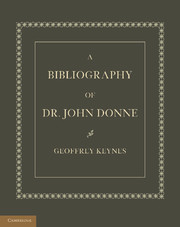Book contents
- Frontmatter
- Dedication
- ABBREVIATIONS
- GENERAL PREFACE
- Contents
- ILLUSTRATIONS
- PROSE WORKS
- POETICAL WORKS
- WALTON'S ‘LIFE OF DONNE’
- APPENDIXES I-VI
- APPENDIXES I Works by John Donne, D.C.L
- APPENDIXES II Works by John Done
- APPENDIXES III Books dedicated to Donne
- APPENDIXES IV Books from Donne's Library
- APPENDIXES V Biography and Criticism
- APPENDIXES VI Iconography
- LIBRARIES CONSULTED
- LIST OF PRINTERS AND PUBLISHERS, 1607-1719
- GENERAL INDEX
APPENDIXES IV - Books from Donne's Library
from APPENDIXES I-VI
Published online by Cambridge University Press: 05 June 2016
- Frontmatter
- Dedication
- ABBREVIATIONS
- GENERAL PREFACE
- Contents
- ILLUSTRATIONS
- PROSE WORKS
- POETICAL WORKS
- WALTON'S ‘LIFE OF DONNE’
- APPENDIXES I-VI
- APPENDIXES I Works by John Donne, D.C.L
- APPENDIXES II Works by John Done
- APPENDIXES III Books dedicated to Donne
- APPENDIXES IV Books from Donne's Library
- APPENDIXES V Biography and Criticism
- APPENDIXES VI Iconography
- LIBRARIES CONSULTED
- LIST OF PRINTERS AND PUBLISHERS, 1607-1719
- GENERAL INDEX
Summary
PREFACE
DONNE'S erudition and virtuosity in ecclesiastical polemics can only have been founded on hard reading and familiarity with contemporary writings. He is likely, therefore, to have possessed a considerable library, and the chief evidence of its contents is described in this appendix, where are recorded 197 works associated with evidence of his ownership. It is noticeable that the great majority of them were published before the appearance of Pseudo-Martyr in 1610, the work for which Donne first applied himself seriously to controversial theology. It is still more remarkable that very few of the books were published after 1615, the year in which he took orders. It seems, therefore, that he collected a good part of his library while at work on Pseudo-Martyr and that he bought fewer books after entering the Church. Sixty-one of these books were described in the second edition of this Bibliography, these including twenty identified by Mr John Sparrow among Selden's 8000 books in the Bodleian Library. Twenty more came to light from various sources during the next seventeen years and these I listed in 1949. Shortly after this the attention of Professor R. C. Bald was drawn to the fact that there are a considerable number of Donne's books in the Middle Temple Library among those bequeathed by Robert Ashley in 1641. At Professor Bald's suggestion these were investigated by Mr John Sparrow, who published in the Times Lit. Sup., 29 July, 5 Aug. 1955, two articles summarily describing the sixty-one volumes thus brought to light. Not all the books in this library, including eight here marked ‘not verified’, are at present accessible, so that there may be yet others awaiting identification. A few additional titles have been recently added from other sources, such as the library of the Royal College of Physicians and Bishop Marsh's Library, Dublin, and I have identified a further number by re-examination of some composite volumes in the Selden collection and in the Cambridge University Library.
An inscription by a later owner in one of the books records that it was bought in Duck Lane in December 1633, suggesting that most of Donne's library was sold soon after his death and was thus dispersed gradually through the booksellers.
- Type
- Chapter
- Information
- A Bibliography of Dr. John Donne , pp. 204 - 222Publisher: Cambridge University PressPrint publication year: 2013



